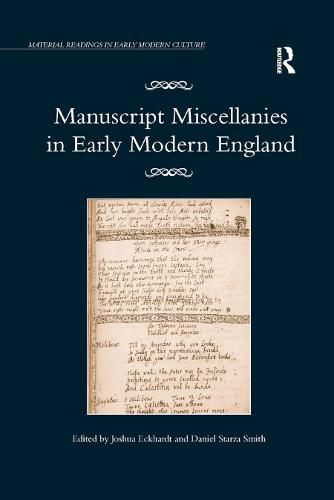Readings Newsletter
Become a Readings Member to make your shopping experience even easier.
Sign in or sign up for free!
You’re not far away from qualifying for FREE standard shipping within Australia
You’ve qualified for FREE standard shipping within Australia
The cart is loading…






Perhaps more than any other kind of book, manuscript miscellanies require a complex and ‘material’ reading strategy. This collection of essays engages the renewed and expanding interest in early modern English miscellanies, anthologies, and other compilations.
Manuscript Miscellanies in Early Modern England models and refines the study of these complicated collections. Several of its contributors question and redefine the terms we use to describe miscellanies and anthologies. Two senior scholars correct the misidentification of a scribe and, in so doing, uncover evidence of a Catholic, probably Jesuit, priest and community in a trio of manuscripts. Additional contributors show compilers interpreting, attributing, and arranging texts, as well as passively accepting others’ editorial decisions.
While manuscript verse miscellanies remain appropriately central to the collection, several essays also involve print and prose, ranging from letters to sermons and even political prophesies. Using extensive textual and bibliographical evidence, the collection offers stimulating new readings of literature, politics, and religion in the early modern period, and promises to make important interventions in academic studies of the history of the book.
$9.00 standard shipping within Australia
FREE standard shipping within Australia for orders over $100.00
Express & International shipping calculated at checkout
Perhaps more than any other kind of book, manuscript miscellanies require a complex and ‘material’ reading strategy. This collection of essays engages the renewed and expanding interest in early modern English miscellanies, anthologies, and other compilations.
Manuscript Miscellanies in Early Modern England models and refines the study of these complicated collections. Several of its contributors question and redefine the terms we use to describe miscellanies and anthologies. Two senior scholars correct the misidentification of a scribe and, in so doing, uncover evidence of a Catholic, probably Jesuit, priest and community in a trio of manuscripts. Additional contributors show compilers interpreting, attributing, and arranging texts, as well as passively accepting others’ editorial decisions.
While manuscript verse miscellanies remain appropriately central to the collection, several essays also involve print and prose, ranging from letters to sermons and even political prophesies. Using extensive textual and bibliographical evidence, the collection offers stimulating new readings of literature, politics, and religion in the early modern period, and promises to make important interventions in academic studies of the history of the book.